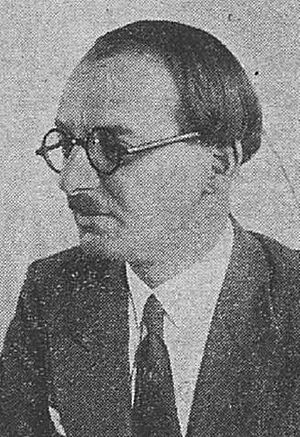Emil Dorian facts for kids
Emil Dorian, born Emil Lustig (February 16, 1893 – 1956), was a talented Romanian writer and poet. He was also a medical doctor.
Born into a Jewish family in Bucharest, Romania, Emil went to high school in his hometown. He then studied medicine at Bucharest University. Even though he wasn't yet a Romanian citizen, he served as a doctor on the front lines during World War I. After the war, he spent two years in France to specialize further in medicine. He later worked as a doctor in Bucharest. He was also very active in the Jewish community, helping with important reports about their situation.
Contents
Emil Dorian's Writing Journey
Emil Dorian used several pen names for his journalistic work, such as Dr. Knox, Dr. Otorin, and Dr. M. Prunk. His writings appeared in many newspapers and magazines like Cotidianul, Ziua, and Sburătorul.
Early Poetry and Books
His very first poems were published in 1912. His first book was a collection of poems called Cântece pentru Lelioara (1923). He followed this with another poetry book, În pragul serii (1924). Later, he wrote Primăvară nouă (1948) and Steagurile inimii (1949). These poems were written in a style that fit the ideas of the government at the time. He also wrote a special poetry book for children called Bună dimineața (1953).
Novels and Other Writings
Emil Dorian wrote novels that explored social issues, often focusing on the lives of Jewish people in his community. Some of these novels include Profeți și paiațe (1931), Vagabonzii (1935), and Otrava (1947).
He also wrote books to help people understand medicine better. He put together a collection of texts about the history of science in Romania, called Din trecutul nostru științific (1955). Interestingly, he even wrote a novel about the insect world, observing their social lives, titled Memoriile greierului (1937).
Translations and Personal Diary
Emil Dorian translated works by famous authors like Heinrich Heine. He also kept a detailed diary starting in 1937. In his diary, he wrote about the challenges he faced as a writer. He also recorded the growing political problems around him during that time.
During World War II, a difficult period in Romania, the government officially banned all of his work because he was Jewish. This was a very challenging time for him.
In the mid-1930s, he became very interested in Yiddish poetry. He translated and collected over 400 Yiddish poems. These poems were ready to be published in 1944, but they were not actually printed until 1996.


